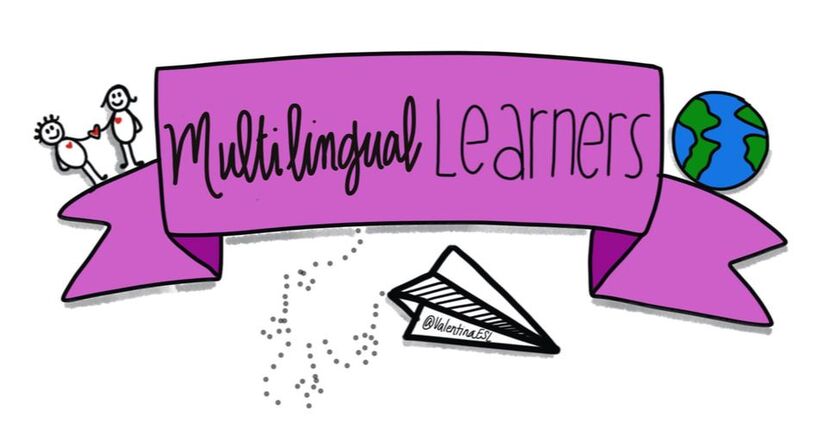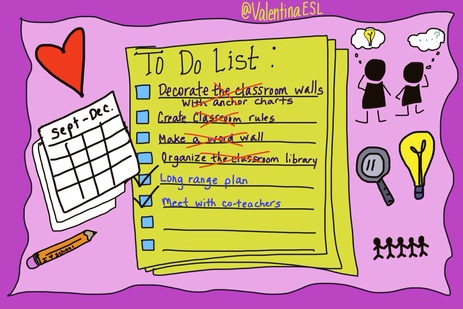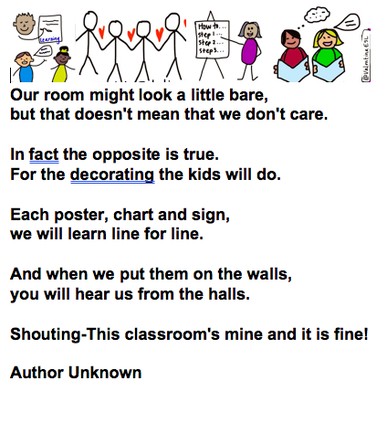|
You know that list...that list of all the things you want to get done before the first day of school. We could really make it easier on ourselves as teachers AND better for our students if we eliminated 4 tasks! 1. Decorating the walls with posters, charts, etc. I used to spend DAYS decorating my room until one year when I had an eye opening experience. It was the year my son was starting pre-K and I took him to "Meet the Teacher". We walked in and the first thing I noticed was that the walls were bare. I thought to myself, "she'll be up here all night getting this room ready for tomorrow" (which was the first day of class). NOPE! I was wrong. The next morning when I dropped my son off, nothing had changed. I was a bit scared. That year, my son learned more than any year after that (and he's 15 now). Why? Because as the walls grew, he grew. And he owned the learning. He took part in the learning. Since then, I changed my view on wall space. Not everything has to be co-created with the students, but if I really want them to retain it, I create it with them. And I don't spend hours decorating the walls before school starts. (See file upload below or click here for a poem you can place on your empty wall to explain to parents why the wall is bare.) Instead I use that time to long range plan. I look ahead at the curriculum and assessments and begin to plot out the lessons. 2. Creating classroom rules. I'm guilty of this one too! I used to think of rules for my class before I even had a class of students. I thought I needed to control this. And then on the first day of class I explicitly taught the class MY rules. One day I heard about creating social contracts and the light went off! I've always been a supporter of giving students choice and ownership, so the social contract was up my alley. With a social contract, the class decides together on non-negotiables or rules. The students decide on how they want their classroom to be run and each student agrees and signs the contract. We made ours on a large sheet on anchor chart paper. I wrote what they told be to write. And then any time someone wasn't abiding by the contract, we referred to it and reminded ourselves that we made that agreement. So instead of pre-planning the classroom rules, I'm freed up to begin building relationships with my co-teachers. We can look at individual student needs to ensure that our lessons take a proactive approach. 3. Making a word wall. I used to spend hours making one of these! I would decide on all the words. I would type them. I laminated them and then cut them. It was all uniform and looked great! Took me forever and guess what? It was mostly a waste of my time. Teacher created word walls are accessible to a small group of students. When students are involved in the process of created the word wall, it becomes more comprehensible to them. Instead of created the entire word wall, our time is better spent deciding on the unit or theme of the word wall and creating an outline of the graphic organizer for the word wall. Then students can add labeled pictures and real objects to the wall during instruction. Now that I'm not spending hours creating the actual word wall, I spend my time looking at the curriculum and deciding what is critical for the students. I sketch out a graphic organizer that will support the information they need to learn and I create a skeletal outline of the organizer on the wall (either on chart paper or with tape on the dry erase board). Then it's ready for my students to interact with. Click here to learn more about interactive word walls. 4. Organizing the classroom library. We have to let go of this task. Students can take ownership of the classroom library by helping to organize the books into categories. Depending on the age/grade level of the students we can either give them categories or let them work in groups to determine categories for the books. This practice will support building community as well as allow students to forge excitement for reading. Now that I have these hours back, I can look deeply into the reading and writing units of study. I am given back time to plan out the first read aloud I will do to explicitly model what readers do. I can also start to draft mini lessons for workshop. This is valuable time for planning instruction. We have lots to do! Let's look at all of our work and decide on what is truly need and beneficial to our students and what can be rethought. It's not that we won't have posters on our walls, rules in our classroom, a word wall, or an organized classroom library. It's just that these things don't need to be completed by the first day of class before your students arrive. On the contrary, our students will benefit from being part of the process of 4 of these tasks.
8/31/2017 01:49:31 pm
Yay! I absolutely agree with you on these. Nothing goes up in my room until the students are there to co-create with me. I'm learning a lot from reading your blog, though. For one, I had never heard of 'anchor charts' before starting to read your posts. I think I have done something like this in the past, but did not know it had a name or that there were best practices for creating them. Thank you for sharing of yourself!
Valentina
9/1/2017 08:09:52 am
Thank you, Kelly. It's my pleasure to share everything I can. I'm grateful to those who have and are sharing with me too! I learn so much from reading books, blogs, and twitter. How did find my blog? Was it through Twitter? Good luck this school year and keep in touch. Comments are closed.
|
Categories
All
|
||||||



 RSS Feed
RSS Feed
